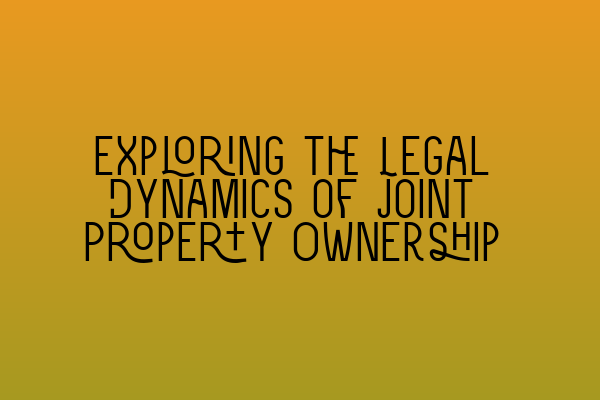Exploring the Legal Dynamics of Joint Property Ownership
When it comes to property ownership, there are various legal dynamics at play, especially when multiple individuals share ownership rights. Joint property ownership can be a complex and intricate matter, governed by specific laws and regulations.
In this blog post, we will delve into the legal nuances of joint property ownership, discussing its types, rights and responsibilities of co-owners, and potential disputes that may arise. Whether you are a solicitor, a property owner, or simply interested in property law, this article will provide you with valuable insights.
Types of Joint Property Ownership
Joint property ownership refers to the situation where two or more individuals share ownership rights in a property. There are two main types of joint property ownership:
1. Joint Tenancy: In joint tenancy, all co-owners have equal shares of the property. The key feature of joint tenancy is the right of survivorship, which means that if one co-owner passes away, their share automatically transfers to the surviving co-owners. This type of ownership is commonly used by married couples and business partners.
2. Tenancy in Common: Unlike joint tenancy, tenancy in common allows co-owners to have unequal shares in the property. Each co-owner holds a specific percentage or interest in the property, which can be sold, transferred, or inherited. In the event of a co-owner’s death, their share does not automatically transfer to the remaining co-owners but passes on according to their will or the laws of intestacy.
Rights and Responsibilities of Co-Owners
When multiple individuals share ownership of a property, they each possess certain rights and responsibilities. Here are some key aspects to consider:
1. Right to Use and Possess: Each co-owner has the right to use and possess the entire property, regardless of their share. However, they must exercise this right in a way that does not infringe upon the rights of other co-owners.
2. Right to Income and Profits: Unless otherwise agreed upon, co-owners are entitled to receive a fair share of any income or profits generated from the property. This includes rental income or proceeds from the sale of the property.
3. Financial Contributions: Co-owners may have different financial contributions towards the acquisition or maintenance of the property. It is important to document these contributions and agree on how expenses and liabilities will be divided.
4. Decision-Making: Significant decisions related to the property, such as renovations, leasing, or selling, require the unanimous consent of all co-owners. However, routine maintenance decisions can be made by a majority vote, unless otherwise specified in a legal agreement.
Potential Disputes and Resolutions
Despite their shared ownership, co-owners can find themselves in disputes over various matters. Some common disputes that may arise in joint property ownership include:
1. Use of the Property: Disagreements can arise over how the property is used and shared among co-owners. For example, one co-owner may want to sell the property while another wants to continue using it for personal reasons.
2. Maintenance and Repairs: Disputes may occur when co-owners have differing opinions on the necessary maintenance and repairs of the property. These disagreements can escalate if the parties fail to reach a consensus.
3. Sale or Partition: If co-owners cannot resolve their disputes, they may choose to sell the property and divide the proceeds or partition the property. Partition involves physically dividing the property into separate portions, with each co-owner obtaining exclusive ownership of their allocated share.
These disputes can be complex and require legal intervention to find a fair resolution. It is advisable for co-owners to seek the assistance of a skilled property law solicitor who can provide guidance and represent their interests.
Conclusion
Joint property ownership entails a range of legal dynamics and considerations. Understanding the types of joint ownership, rights and responsibilities of co-owners, and potential disputes that may arise is essential for property owners and legal professionals.
At SQE Property Law & Land Law, we specialize in providing expert legal advice and services related to property ownership and disputes. Our team of experienced solicitors can guide you through the complex legal landscape, ensuring your rights and interests are protected.
If you are preparing for the SQE exams or looking for further resources related to property law, we recommend exploring our SQE 1 Practice Exam Questions and SQE 1 Practice Mocks FLK1 FLK2. Additionally, if you are seeking comprehensive preparation courses for the SQE exams, check out our SQE 2 Preparation Courses and SQE 1 Preparation Courses to enhance your knowledge and skills.
Stay informed about the latest SRA SQE Exam Dates by visiting our SRA SQE Exam Dates page, and feel free to reach out to us for any property law-related queries or assistance.
